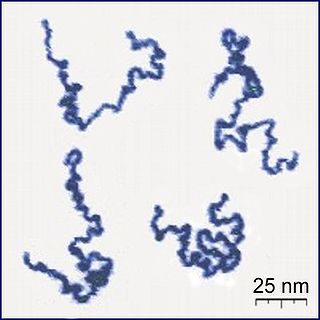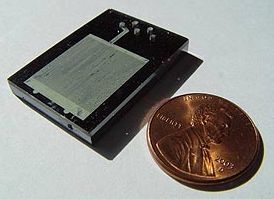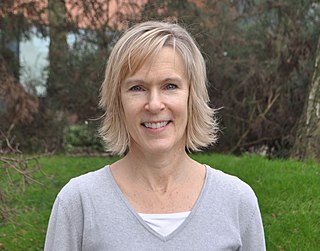
A polymer is a substance or material that consists of very large molecules, or macromolecules, that are constituted by many repeating subunits derived from one or more species of monomers. Due to their broad spectrum of properties, both synthetic and natural polymers play essential and ubiquitous roles in everyday life. Polymers range from familiar synthetic plastics such as polystyrene to natural biopolymers such as DNA and proteins that are fundamental to biological structure and function. Polymers, both natural and synthetic, are created via polymerization of many small molecules, known as monomers. Their consequently large molecular mass, relative to small molecule compounds, produces unique physical properties including toughness, high elasticity, viscoelasticity, and a tendency to form amorphous and semicrystalline structures rather than crystals.

A microreactor or microstructured reactor or microchannel reactor is a device in which chemical reactions take place in a confinement with typical lateral dimensions below 1 mm; the most typical form of such confinement are microchannels. Microreactors are studied in the field of micro process engineering, together with other devices in which physical processes occur. The microreactor is usually a continuous flow reactor. Microreactors can offer many advantages over conventional scale reactors, including improvements in energy efficiency, reaction speed and yield, safety, reliability, scalability, on-site/on-demand production, and a much finer degree of process control.
In polymer chemistry, anionic addition polymerization is a form of chain-growth polymerization or addition polymerization that involves the polymerization of monomers initiated with anions. The type of reaction has many manifestations, but traditionally vinyl monomers are used. Often anionic polymerization involves living polymerizations, which allows control of structure and composition.
Jean M.J. Fréchet is a French-American chemist and professor emeritus at the University of California, Berkeley. He is best known for his work on polymers including polymer-supported chemistry, chemically amplified photoresists, dendrimers, macroporous separation media, and polymers for therapeutics. Ranked among the top 10 chemists in 2021, he has authored nearly 900 scientific paper and 200 patents including 96 US patents. His research areas include organic synthesis and polymer chemistry applied to nanoscience and nanotechnology with emphasis on the design, fundamental understanding, synthesis, and applications of functional macromolecules.

Owen Wright Webster was a distinguished member of the organic and polymer chemistry communities. His polymerization technique for making block copolymer dispersing agents is used by DuPont to make ink-jet printer inks.

Krzysztof "Kris" Matyjaszewski is a Polish-American chemist. He is the J.C. Warner Professor of the Natural Sciences at the Carnegie Mellon University Matyjaszewski is best known for the discovery of atom transfer radical polymerization (ATRP), a novel method of polymer synthesis that has revolutionized the way macromolecules are made.

Mohammad-Nabi Sarbolouki was a distinguished Iranian biophysicist and polymer chemist and one of the most influential individuals behind modern scientific movement in Iran. He was known as the inventor of a DNA vehicle called "dendrosome". Sarbolouki was one of the main founders and pioneers of nano science, biomaterials, biotechnology and biophysics in Iran.

Jindřich Henry Kopeček was born in Strakonice, Czech Republic, as the son of Jan and Herta Zita (Krombholz) Kopeček. He is distinguished professor of pharmaceutical chemistry and distinguished professor of biomedical engineering at the University of Utah in Salt Lake City, Utah. Kopeček is also an honorary professor at Sichuan University in Chengdu, China. His research focuses on biorecognition of macromolecules, bioconjugate chemistry, drug delivery systems, self-assembled biomaterials, and drug-free macromolecular therapeutics.
David A. Tirrell is an American chemist and the Ross McCollum-William H. Corcoran Professor and professor of chemistry and chemical engineering at the California Institute of Technology (Caltech). A pioneer in the areas of polymer synthesis and protein biosynthesis, his research has a wide range of applications, including coatings, adhesion, lubrication, bioengineering and biomedical intervention. From 2012 to 2018, Tirrell was the director of the Beckman Institute at Caltech. As of 2017, he serves as Caltech's Provost. He is one of very few American scientists to have been elected to all three branches of the United States National Academies: the National Academy of Sciences (2006), the National Academy of Engineering (2008), and the Institute of Medicine (2011). He was elected a Member of the American Philosophical Society in 2019.

In polymer chemistry, graft polymers are segmented copolymers with a linear backbone of one composite and randomly distributed branches of another composite. The picture labeled "graft polymer" shows how grafted chains of species B are covalently bonded to polymer species A. Although the side chains are structurally distinct from the main chain, the individual grafted chains may be homopolymers or copolymers. Graft polymers have been synthesized for many decades and are especially used as impact resistant materials, thermoplastic elastomers, compatibilizers, or emulsifiers for the preparation of stable blends or alloys. One of the better-known examples of a graft polymer is a component used in high impact polystyrene, consisting of a polystyrene backbone with polybutadiene grafted chains.
Karen L. Wooley is an American polymer chemist. She is a Distinguished Professor at Texas A&M University whose research focuses on developing novel polymers and nanostructured materials. Previously, she was the James S. McDonnell Distinguished University Professor in Arts & Sciences at Washington University in St. Louis.

Automated synthesis or automatic synthesis is a set of techniques that use robotic equipment to perform chemical synthesis in an automated way. Automating processes allows for higher efficiency and product quality although automation technology can be cost-prohibitive and there are concerns regarding overdependence and job displacement. Chemical processes were automated throughout the 19th and 20th centuries, with major developments happening in the previous thirty years, as technology advanced. Tasks that are performed may include: synthesis in variety of different conditions, sample preparation, purification, and extractions. Applications of automated synthesis are found on research and industrial scales in a wide variety of fields including polymers, personal care, and radiosynthesis.

Eugenia Eduardovna Kumacheva is a University Professor and Distinguished Professor of Chemistry at the University of Toronto. Her research interests span across the fields of fundamental and applied polymers science, nanotechnology, microfluidics, and interface chemistry. She was awarded the L'Oréal-UNESCO Awards for Women in Science in 2008 "for the design and development of new materials with many applications including targeted drug delivery for cancer treatments and materials for high density optical data storage". In 2011, she published a book on the Microfluidic Reactors for Polymer Particles co-authored with Piotr Garstecki. She is Canadian Research Chair in Advanced Polymer Materials. She is Fellow of the Royal Society (FRS) and a Fellow of the Royal Society of Canada (FRSC).
Klavs Flemming Jensen is a chemical engineer who is currently the Warren K. Lewis Professor at the Massachusetts Institute of Technology (MIT).

Kristi Lynn Kiick is the Blue and Gold Distinguished Professor of Materials Science and Engineering at the University of Delaware. She studies polymers, biomaterials and hydrogels for drug delivery and regenerative medicine. She is a Fellow of the American Chemical Society, the American Institute for Medical and Biological Engineering, and of the National Academy of Inventors. She served for nearly eight years as the deputy dean of the college of engineering at the University of Delaware.

Julia A. Kornfield is a Professor of Chemical Engineering at the California Institute of Technology. A world expert in polymer science, Kornfield's research encompasses the development of mega-supramolecular systems for fuel additives and intraocular lenses, as well as the influence of flow on polymer chains.

Lilo Danielle Pozzo is an American chemical engineer who is a professor of chemical engineering at the University of Washington. Her research considers the development, measurement and control of molecular self-assembly. She is interested in the realization of materials for energy storage and conversion. Pozzo serves on the editorial board of the Royal Society of Chemistry journal Digital Discovery.
Lynn Walker is a professor at the Department of Chemical Engineering and Materials Science, University of Minnesota. Her research considers the rheology of complex fluids and how nanostructure impacts the behavior of complex systems. She is a Fellow of the American Institute of Chemical Engineers, the Society of Rheology, and the American Physical Society.

Miriam Margarethe Unterlass is a German chemist. She is full professor of solid state chemistry at the University of Konstanz, as well as adjunct principal investigator at CeMM - Research Center for Molecular Medicine of the Austrian Academy of Sciences. On 1 October 2024, Prof. Miriam Unterlass took over the management of the renowned Fraunhofer Institute for Silicate Research ISC in Würzburg.

Yves Gnanou is a French chemist, academic and author. He is the Ibn Alhaytham Distinguished Professor of Chemistry at King Abdullah University of Science and Technology.














